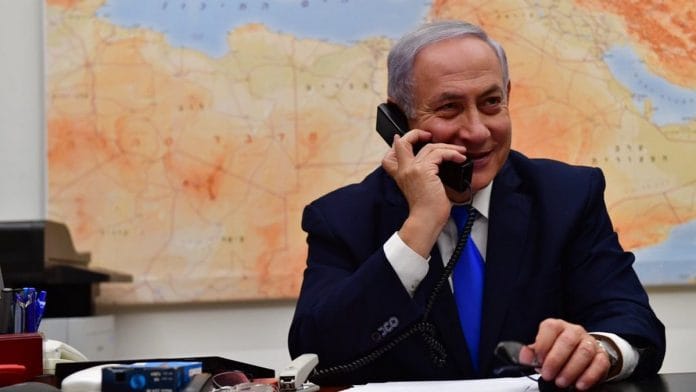New Delhi: With Benjamin Netanyahu set to be Prime Minister of Israel for the fifth time, India may find it difficult to adhere to its decades-old two-state theory, something that every successive government in New Delhi has followed.
In a last-minute call to his Right-wing nationalist base, Netanyahu, who has been in power without interruption since 2009, asserted once again that he will not let a Palestinian state be created.
While the election results are yet to be officially announced in Israel, Netanyahu’s main challenge now will be to build a coalition and form a cabinet.
How the situation has changed
When Narendra Modi became the first Indian PM to visit Israel in July 2017, he had hoped India would be able to mediate some sort of peace between Israel and Palestine.
The India-Israel joint statement at the time had said: “The two prime ministers discussed the developments pertaining to the Israeli-Palestinian peace process. They underlined the need for the establishment of a just and durable peace in the region. They reaffirmed their support for an early negotiated solution between the sides based on mutual recognition and security arrangements.”
Two months before, in May 2017, New Delhi had affirmed its support for the Palestinian cause when its president Mahmoud Abbas visited India. On his return visit to Palestine in February 2018, Modi repeated his hope of India being the mediator of peace.
However, the situation is no longer the same. US President Donald Trump has put his weight behind Netanyahu’s ambition to not to spare any land for the Palestinians, official sources told ThePrint.
In December 2017, Trump proclaimed that Washington recognises Jerusalem as the new capital of Israel, and would shift the American Embassy there from Tel Aviv, which happened in May 2018.
During a vote in the United Nations on Jerusalem, India remained firm on its stance and supported Palestine.
Pinak Ranjan Chakravarty, a former secretary at the Ministry of External Affairs and visiting fellow at the Observer Research Foundation said there will not be a change in India’s policy.
“There will not be any change in India’s policy towards the two-state theory, but it is clear that Netanyahu is no longer going to follow it anymore. With support from the US, he will offer a moth-eaten Palestine,” Chakravarty said, adding that Israel understands why India continues to take such a stance.
Also read: Israeli PM Benjamin Netanyahu likely to secure a record fifth term
Diplomatic relations & defence cooperation
India had recognised Israel as an independent country in 1950 under Jawaharlal Nehru. But it was only under P.V. Narasimha Rao in 1992 that India established diplomatic relations with the country.
In 2003, Israeli PM Ariel Sharon had visited India, but neither the PM at the time, Atal Bihari Vajpayee, nor his successor Manmohan Singh ever visited Israel.
It was during Modi’s 2017 visit that India and Israel elevated their relationship to a ‘strategic partnership’.
Today, Israel is India’s third largest arms supplier. Between 2014 and 2018, arms exports from Israel to India have witnessed a significant jump, according to the latest Stockholm International Peace Research Institute (SIPRI) report.
In November 2016, both sides signed a deal worth $1.5 billion for two additional Phalcon airborne warning and control system. In 2017, India entered into a deal with Israel to buy the Barak-8 air defence system for the Army and the Navy for $2 billion.
However, defence cooperation between the countries suffered a setback when India cancelled a $500 million deal with Israel to buy Spike anti-tank guided missiles for the army. India had later said it had resumed the dialogue with Israel and that the deal was in the pipeline. In August 2017, India’s Kalyani Strategic Systems Ltd signed a joint venture with Israel’s Rafael Advanced Defense Systems Ltd to manufacture the missiles in India.
In January 2018, Punj Lloyd announced a collaboration with Israel Weapon Industries (IWI) to manufacture small weapons in Gwalior, Madhya Pradesh, under a complete technology transfer arrangement.
Also read: How Benjamin Netanyahu is placed in Israel’s general elections and why







India does not have the influence to shape the outcome in the region. Burying the two state solution will be a huge setback, something for other, more consequential states to ponder over. It will keep the region on the boil, add fuel to the scourge of terrorism. India – Israel relations have a large component of weapons purchases, other non specified security cooperation. That should continue, but the traditional policy of keeping the relationship slightly in the background – if not in the closet, which was the earlier phase – served India’s interests well. On a visit to China, PM Netanyahu had said, This is a marriage made in heaven.